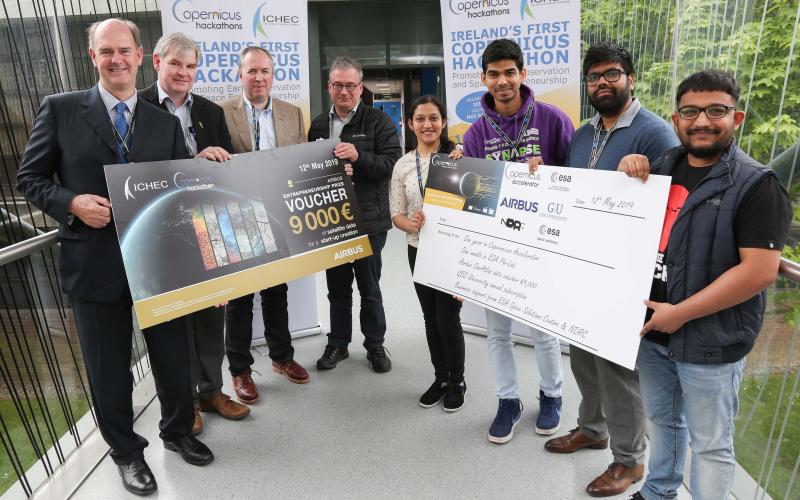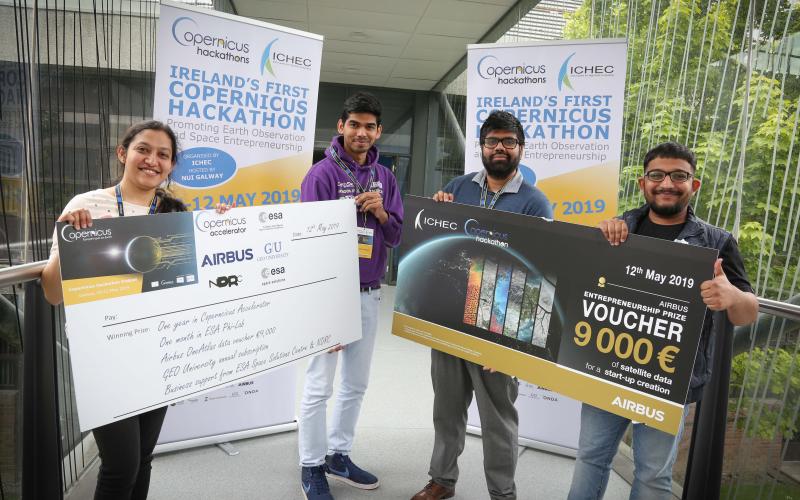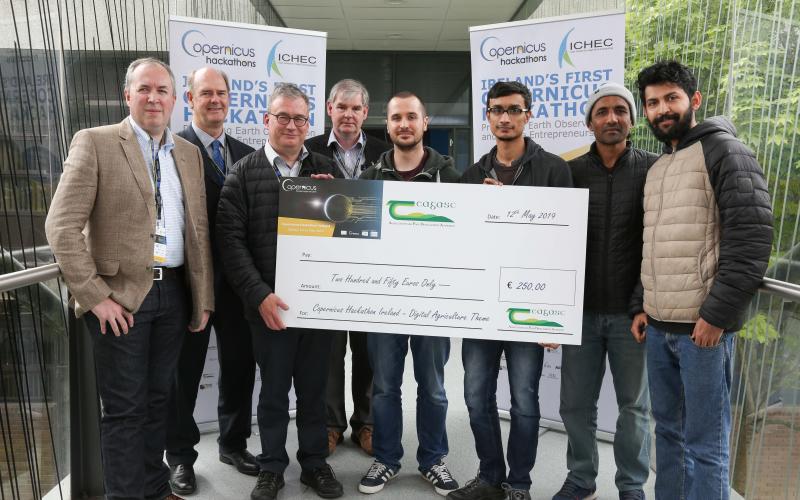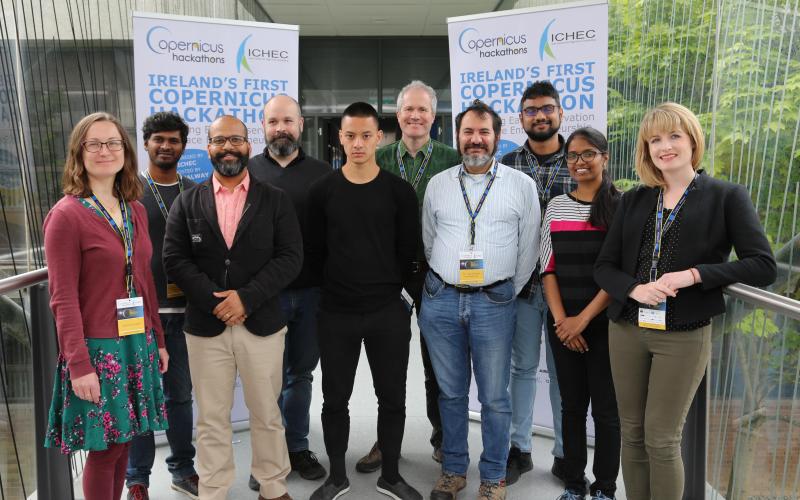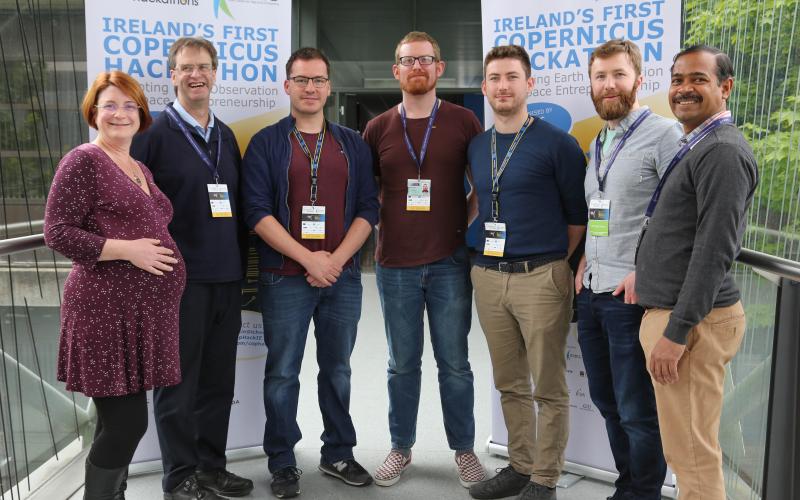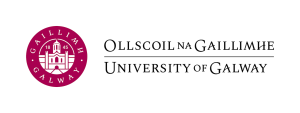Copernicus Hackathon Ireland Raises Awareness of Programme that puts Europe at the forefront of Earth Observation
The first Irish Copernicus Hackathon competition took place last Sunday (12 May 2019). It was organised and hosted by the Irish Centre for High-End Computing (ICHEC) based at NUI Galway, with a wide range of Irish and European partners involved. The winning team were four graduates from NUI Galway, now working in Dublin. They presented a solution based on detecting eutrophication of coastal waters using Sentinel 2 data and creating alerts and visualisations for water quality managers. Other winning concepts included fire detection alerts, real-time emissions monitoring for big business and governments and Smart Agriculture solutions.
Hackathon participants were challenged to come up with solutions for real-world problems using Copernicus satellite data (Copernicus is the European Earth Observation programme), competing for a range of awards, including cash prizes. The winners will be offered a place in the Copernicus Accelerator which offers a customised business development scheme for 50 visionary start-ups and entrepreneurs from Copernicus Participating Countries, the EU, Norway and Iceland, every year. A 30-day residency to develop solutions in the European Space Agency’s innovation-focused Phi Lab in Frascati, Italy is another of the prizes on offer.
The themes for the Hackathon contest represent areas where there is already significant expertise in Ireland, or significant need. These include digital agriculture, marine environment and security, unmanned aerial vehicles, energy and power, air quality and sustainable/ rural/socially responsible development.
The aim of Hackathon is to raise awareness of the opportunities presented by the Copernicus Programme. This data-centric programme is supported by the European Space Agency and the European Commission, and will provide earth observation, modelling and in situ data about our environment on an operational basis into the future.
This programme puts Europe at the forefront of Earth Observation, as no other space programme plans to provide the level of high quality, scientifically rigorous data which is currently available from the Copernicus programme and services. This data allows ICHEC to monitor the environment, and having a guaranteed source of high quality data means that it can underpin business solutions to environmental problems for a wide range of applications. The programme is expected to have a return of 10-20 times the investment in it, as solutions are built on the free and open dataset.
Artificial Intelligence approaches to this data is enabling a step change in how the data is used and exploited, allowing huge volumes of data to be processed rapidly rather than requiring human intervention.
Josef Ashbacher, Director of Earth Observation at ESA, commented: “There is a revolution underway in all aspects of space technologies, but especially those that monitor our environment, taking the pulse of our planet from space. Space 4.0 is dramatically lowering costs so that a new generation of entrepreneurs can do business with space.
“Central to this revolution is the use of Artificial Intelligence to realise the full potential of our troves of environmental measurements from space, both to protect the environment and to create new jobs. Ireland, with her wealth of high technology industries, is playing an important role in this revolution. Indeed, ESA's first AI mission Φ-sat 1, on a tiny cubesat, includes an Irish designed AI chip and software built by an Irish AI company.”
Mr Ashbacher continued: “The Copernicus Hackathon led by ICHEC at NUI Galway is exactly what's needed to help nurture Irish talent in this area, developing the right skills in young people to build the businesses of the future. We look forward to welcoming the winner at our Φ-lab in Frascati later this year.”
Irish and European businesses recognise the opportunities in this rapidly growing sector. The Icon Group, one of Ireland’s largest providers of EO services, has provided a challenge to monitor grass growth using radar from satellites, and a large cash prize to the best solution to that challenge. Other prizes are being sponsored by Airbus Space & Defence, the Office of Public Works and Teagasc, GEO University, as well as business development supports from the European Space Agency and the European Commission.
Minister of State for Training, Skills, Innovation, Research and Development, John Halligan, T.D., stated: “I am delighted to see the growth of and interest in the Space Sector in Ireland, which is reflected in the success of the Copernicus Hackathon hosted by ICHEC at NUI Galway this weekend. It has attracted significant support and partners from across the sector in Ireland and Europe, due to the potential to expand existing business and create new commercial opportunities using Earth Observation satellite data. It has also attracted a highly qualified, professional group of participants, whose main aims are to succeed in both the competition and in this rapidly-growing sector.
“Ireland has a large pool of the skills required to succeed in this sector and ICHEC, in particular, is ideally placed at the nexus of high performance computing and big data analytics to ensure the further development of these types of activities, and to promote the potential for creativity and high-value jobs in downstream space activities.”
Alongside ICHEC the event partners include TechInnovate at NUI Galway, Baily Labs, the Dept of Geography at University College Cork (UCC), the National Centre for Geocomputation at Maynooth University (MU), The National Centre for Marine and Renewable Energy (MaREI), The Office of Public Works (OPW), Teagasc, Airbus, ONDA-DIAS, ESA Phi-Lab, ESA Space Solutions Centre Ireland, Údarás na Gaeltachta, the Icon Group, GEO University and The National Digital Research Centre (NDRC).
For further information, please contact cophackie@ichec.ie, check out the Facebook event page, or follow on twitter @CopHackIE.

